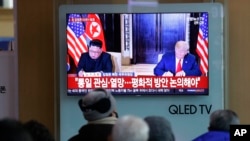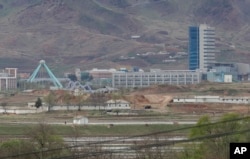North Korean leader Kim Jong Un said Tuesday he hopes to extend his high-stakes nuclear summitry with President Donald Trump into 2019, but also warns Washington not to test North Koreans' patience with sanctions and pressure.
During his televised New Year's speech, Kim said he's ready to meet with Trump at any time to produce an outcome "welcomed by the international community." However, he said the North will be forced to take a different path if the United States "continues to break its promises and misjudges our patience by unilaterally demanding certain things and pushes ahead with sanctions and pressure."
Kim also said the United States should continue to halt its joint military exercises with ally South Korea and not deploy strategic military assets to the South. He also made a nationalistic call urging stronger inter-Korean cooperation and said the North is ready to resume operations at a jointly run factory park in the North Korean border town of Kaesong and restart South Korean tours to the North's Diamond Mountain resort. Neither of those is possible for South Korea unless sanctions are removed.
Some analysts say North Korea has been trying to drive a wedge between Washington and Seoul while putting the larger burden of action on the United States. Pyongyang over the past months has accused Washington of failing to take corresponding measures following the North's unilateral dismantlement of a nuclear testing ground and suspension of nuclear and long-range missile tests.
Kim used his New Year's speech a year ago to start a newfound diplomatic approach with Seoul and Washington, which led to three summits with South Korean President Moon Jae-in and a historic June summit with Trump in Singapore. Kim also met three times with Chinese President Xi Jinping, which boosted his leverage by reintroducing Beijing — Pyongyang's main ally — as a major player in the diplomatic process to resolve the nuclear standoff.
Stalled talks
But nuclear talks between Washington and Pyongyang have stalled in recent months as they struggle with the sequencing of North Korea's disarmament and the removal of U.S.-led sanctions against the North.
The North has also bristled at U.S. demands to provide a detailed account of nuclear and missile facilities that would be inspected and dismantled under a potential deal.
The hardening stalemate has fueled doubts on whether Kim will ever voluntarily relinquish the nuclear weapons and missiles he may see as his strongest guarantee of survival. In his meetings with Trump and Moon, Kim signed vague statements calling for the "complete denuclearization" of the Korean Peninsula without describing when and how it would occur.
But North Korea for decades has been pushing a concept of denuclearization that bears no resemblance to the American definition, with Pyongyang vowing to pursue nuclear development until the United States removes its troops and the nuclear umbrella defending South Korea and Japan. The North in a blunt statement last month reiterated its traditional stance on denuclearization, saying it will never unilaterally give up its weapons unless Washington removes what Pyongyang describes as a nuclear threat.
Washington and Pyongyang have yet to reschedule a meeting between U.S. Secretary of State Mike Pompeo and senior North Korean officials after the North canceled it at the last minute in November. There are views that North Korea wants a quick second summit because it thinks it can win major concessions from Trump that they probably couldn't from lower-level U.S. officials, who are more adamant about the North committing to inspections and verification.





